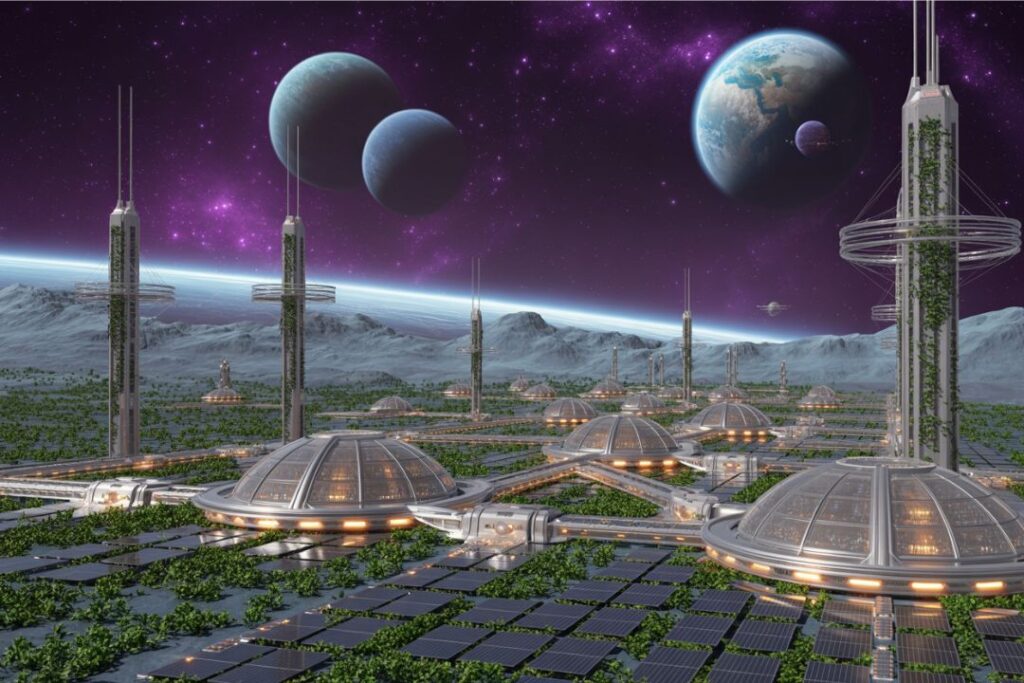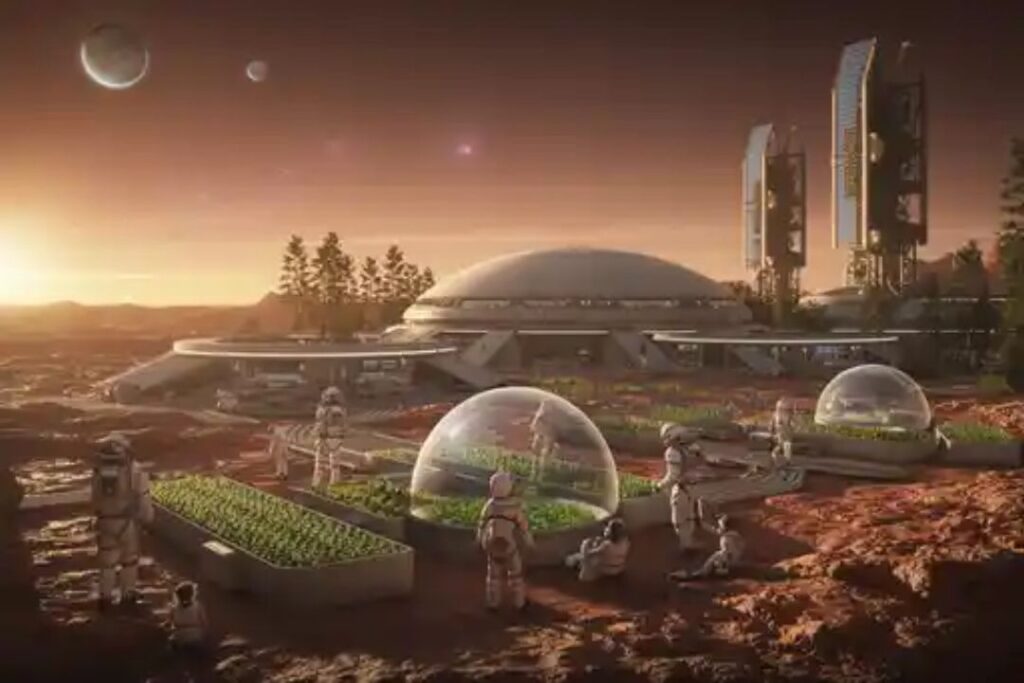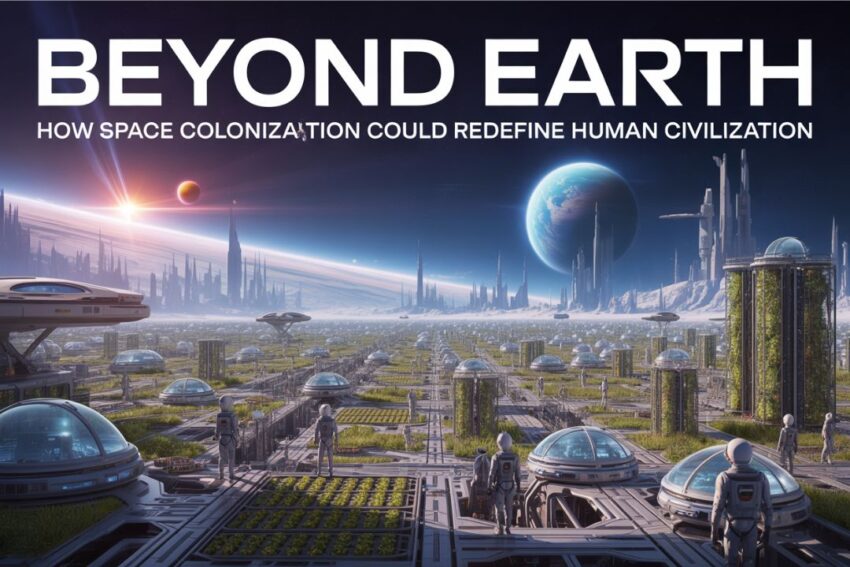Introduction: Humanity’s Next Great Leap
For thousands of years, humanity has gazed at the stars and dreamed of exploring them. Today, that dream is no longer just a fantasy—it’s becoming a plan. With rapid advancements in rocket technology, AI, and life-support systems, space colonization is emerging as the next great chapter in human history.
What began as a race to reach the Moon has evolved into a race to settle the cosmos. The question is no longer if humans will live beyond Earth, but when—and how it will reshape civilization itself.
In this article, we’ll explore the science, economics, ethics, and future of colonizing other worlds, and how this bold endeavor could redefine humanity’s destiny.
What Is Space Colonization?
Space colonization refers to the establishment of permanent human settlements beyond Earth—on celestial bodies like the Moon, Mars, or even artificial habitats in orbit. Unlike short-term missions or tourism, colonization aims for long-term survival and self-sufficiency.
This involves:
- Building habitats that can withstand radiation and extreme temperatures
- Producing food, water, and oxygen locally
- Developing renewable energy systems
- Creating governance models for off-Earth societies
The ultimate goal is to ensure humanity’s survival beyond our home planet—an insurance policy against extinction-level events on Earth.
Why Colonize Space? The Core Motivations
1. Survival of the Species
Earth faces multiple existential risks: climate change, asteroid impacts, pandemics, and nuclear threats. Colonizing space gives humanity a “backup plan” to ensure the continuity of civilization.

2. Scientific Discovery and Innovation
Living in other worlds will push science and technology beyond current limits. From new materials to medical advances in zero gravity, colonization will accelerate human knowledge.
3. Economic Expansion
Space offers limitless resources—rare minerals, solar energy, and zero-gravity manufacturing potential. Asteroid mining alone could generate trillions of dollars in new wealth.
4. Human Curiosity and Progress
The drive to explore is built into our DNA. Colonizing space isn’t just a necessity—it’s the next step in humanity’s evolution, both intellectually and spiritually.
The Visionaries Leading the Charge
The modern space colonization effort is driven not just by governments, but by visionary entrepreneurs and private companies who see space as the next great economic frontier.
Elon Musk – SpaceX and the Mars Dream
Elon Musk’s SpaceX envisions building a self-sustaining city on Mars by 2050. His Starship spacecraft is designed to carry up to 100 people and large cargo loads across interplanetary distances. Musk’s goal is simple but audacious: make humans a multiplanetary species.
Jeff Bezos – Blue Origin’s Space Civilization Vision
Jeff Bezos believes that humanity’s future lies not on Mars, but in giant orbital habitats capable of housing millions of people. His Blue Origin company is developing reusable rockets to reduce launch costs and enable long-term space living.
NASA and International Partners
NASA’s Artemis Program aims to return humans to the Moon and establish a sustainable base by the 2030s—a stepping stone to Mars. Collaborations with ESA (Europe), JAXA (Japan), and private partners are turning this into a truly global effort.
Building a Civilization in Space: How It Could Work
1. Habitat Construction
Colonies will require durable, radiation-shielded structures. These could be made from lunar regolith, 3D-printed materials, or inflatable modules. Mars colonists may live underground or inside pressurized domes.
2. Sustainable Life Support
Oxygen will be generated by recycling CO₂ and using electrolysis. Food could come from hydroponic or aeroponic farms, and water from ice deposits beneath planetary surfaces.
3. Energy Sources
Solar energy will be the main power supply, supplemented by nuclear reactors for dark or long-duration missions.
4. Transportation Systems
Reusable rockets like SpaceX Starship and Blue Origin New Glenn will enable regular interplanetary travel. In time, space elevators and ion propulsion systems could revolutionize mobility between planets.
5. Economic Systems and Trade
Colonies will initially depend on Earth for supplies. Eventually, they’ll develop local economies — exporting data, minerals, or technology back to Earth. A “space economy” could connect multiple planets in trade networks, much like nations today.
How Space Colonization Will Redefine Human Civilization
1. A New Definition of Citizenship and Governance
Living on Mars or the Moon will require new political systems. Who governs space settlers — Earth nations or a new independent authority?
Some experts predict “space constitutions” defining rights, responsibilities, and ethical rules for off-world societies.
2. Evolution of Human Identity
Space colonists will live in environments vastly different from Earth — lower gravity, closed ecosystems, and artificial day-night cycles. Over generations, this could even lead to biological or cultural divergence between Earthlings and off-world humans.
3. Technological Leap for All Humanity
The technologies developed for colonization — renewable energy, recycling systems, AI robotics — will have massive benefits on Earth. In solving problems for Mars, we may solve Earth’s environmental crisis.
4. Global Unity (or Competition)
Space colonization could either unite nations in a shared goal or trigger a new form of competition for territory and resources. The outcome will depend on early cooperation and clear space laws.
🪙 The Economics of Colonization: Turning the Cosmos into Commerce
1. Cost of Establishment
NASA estimates that building a small, sustainable lunar base could cost $100 billion or more. A full Mars colony may exceed $1 trillion.
These are staggering numbers, but just as early investments in electricity and aviation paid off, space colonization could unlock exponential returns.
2. Potential Revenue Streams
- Asteroid mining: Access to rare elements like platinum and iridium
- Solar energy collection: Harvesting continuous sunlight in orbit
- Space manufacturing: Producing high-value materials in zero gravity
- Tourism and research: Selling access to space environments for science and recreation
3. Private-Public Partnerships
The future of colonization will depend on collaboration between governments and private companies. NASA, ESA, and SpaceX already operate under shared contracts to reduce costs and risks.
Sustainability: Learning to Live Beyond Earth
Space colonies must be fully sustainable, as importing everything from Earth would be impossible.
That means developing closed-loop ecosystems — recycling air, water, and waste continuously.
Research at the International Space Station (ISS) has already demonstrated microgravity agriculture and biological recycling, providing a blueprint for off-world living.
These lessons will also help improve Earth’s sustainability efforts, leading to cleaner cities and more efficient resource management.
Ethical and Social Implications
1. Who Gets to Leave Earth?
Initially, only the wealthy or highly trained will be able to move to space colonies. This raises ethical questions about inequality and access to humanity’s next frontier.
2. Impact on Indigenous Celestial Bodies
If we discover microbial life on Mars or Europa, do we have the right to alter those environments? The ethics of space colonization will shape international policies for decades.
3. Reproduction and Human Health
Long-term living in low gravity could affect human biology — bone loss, muscle atrophy, and fertility are major concerns. Medical research will be essential for multi-generational colonization.
The Future: A Multiplanetary Civilization
Imagine the year 2150:
Humanity has colonies on Mars, lunar mining bases, and orbital cities floating near Earth.
A new generation is born and educated in space — their first view of Earth is not from the ground, but through a window looking down from the stars.
By then, humanity may not identify solely as “Earthlings,” but as citizens of a solar civilization, connected across planets through technology, trade, and shared destiny.

Challenges Ahead
Despite incredible progress, space colonization still faces monumental challenges:
- Reducing launch costs further
- Protecting humans from cosmic radiation
- Building self-sustaining habitats
- Establishing fair laws for space property and citizenship
But every challenge represents an opportunity — for innovation, unity, and the expansion of human potential.
Conclusion: Beyond Earth Lies Our Future
Space colonization isn’t just about escaping Earth — it’s about expanding life.
As we reach beyond our planet, we’re redefining what it means to be human, to explore, and to build.
The path ahead is long and uncertain, but so was every great journey in human history.
From the first ocean explorers to the first astronauts, progress has always belonged to those willing to look beyond the horizon.
Now, as the stars become our next destination, one thing is clear: the future of humanity lies beyond Earth.
